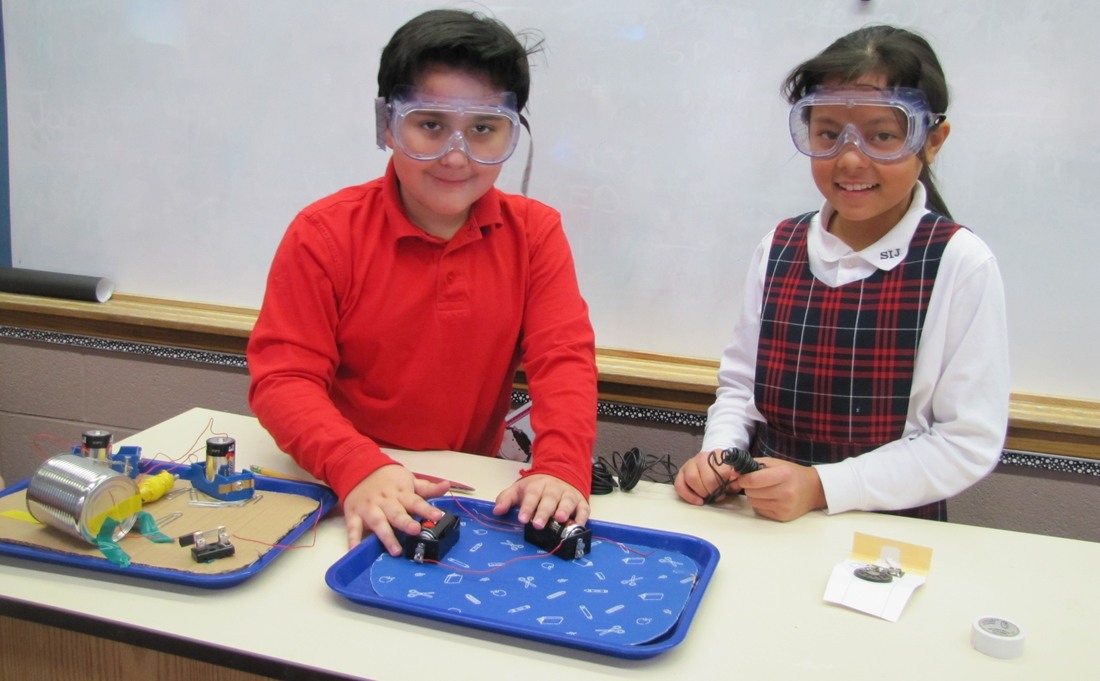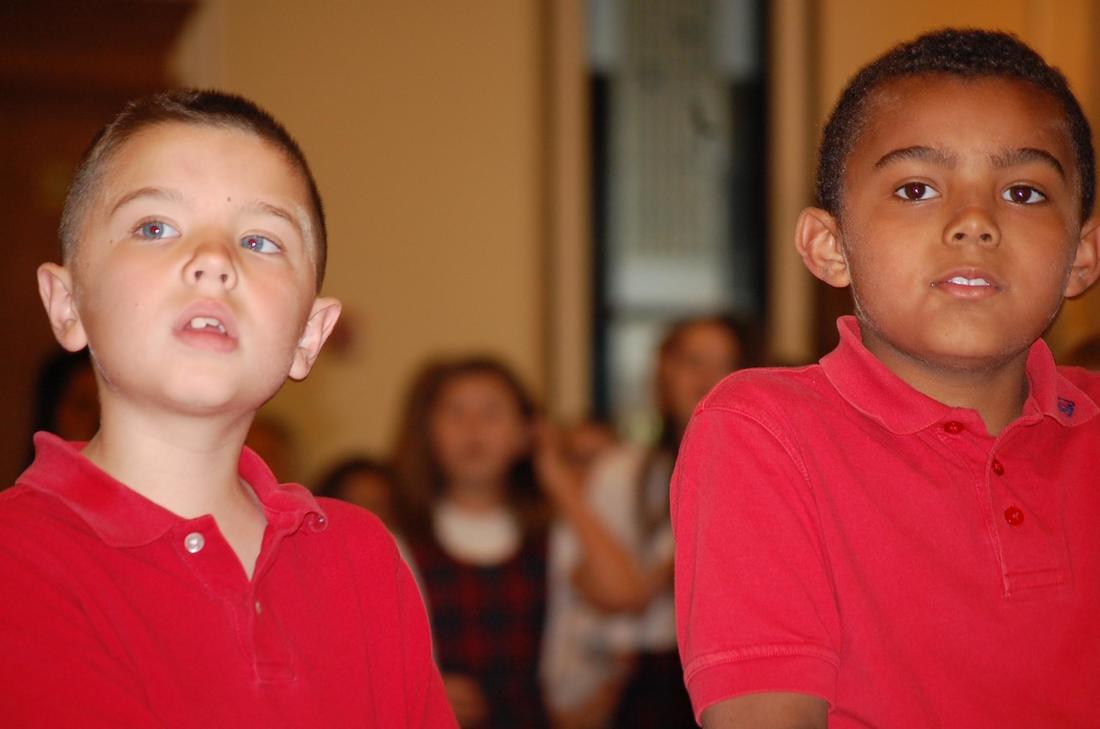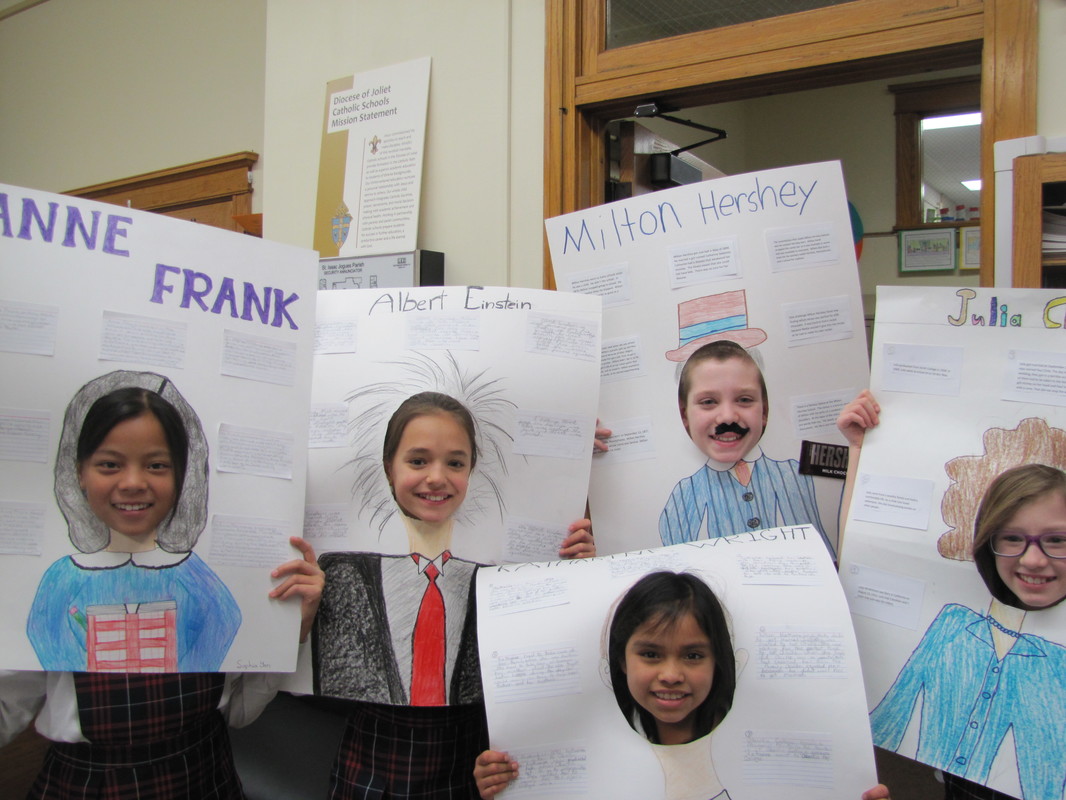4th Grade Curriculum
Religion
Students will learn about the Catholic faith through stories, activities, scripture, prayer, discussion and reflection. Values are integrated into all aspects of learning. Concepts include a study of:
- virtues;
- God, Jesus Christ and the Holy Spirit;
- planning, assisting in liturgy and other forms of worship;
- Commandments;
- service;
- liturgical seasons;
- morality;
- church structure; and
- Beatitudes.
Language Arts
Students will work toward excellence in writing, speaking and listening. Concepts include a study of:
- six traits of writing to compose personal narrative, narrative, expository, and argumentative pieces;
- grammar skills with emphasis on punctuation and the parts of speech;
- small and whole group novel studies focusing on specific higher level reading skills;
- cursive writing patterns with attention to correct formation of capital and lower case letters;
- Daily Oral Language practice; and
- written response utilizing ACE (answer, cite, explain) format.
Reading
The fourth grade program includes reading, writing, speaking, listening and literature study. The program promotes fluency, comprehension, interpretation, communication, listening and speaking effectively. Skills are reinforced in all content areas. Students will experience authentic literature in poetry, nonfiction, and fiction. Concepts include a study of:
- inferencing and drawing conclusions;
- understanding cause and effect;
- understanding plot;
- identifying figurative language;
- sequencing events of a story;
- analyzing details;
- using context clues and other resources to enhance vocabulary;
- identifying the characteristics of fiction;
- stating the author’s purpose; and
- spelling skills including vocabulary enrichment and phonetic patterns.
Mathematics
Students will acquire a knowledge of mathematics and the ability to apply math skills to solve problems through the use of text, extended activities and hands-on experiences. Concepts include the study of:
- identification of place value;
- types of lines and angles;
- multiplication of 2, 3 and 4 digit numbers;
- division utilizing one digit divisor;
- patterns;
- addition and subtraction of fractions;
- decimals;
- units of length, capacity and weight;
- geometric shapes;
- graphs and comparison of data;
- word problems with one variable; and
- problem solving strategies.
Social Studies
Students will acquire social and cultural understanding of the world around them. Concepts include a study of:
- geography/map skills;
- government;
- immigration;
- regions of the U.S.;
- individual state research; and
- meeting needs through goods and services.
Science
Students will use hands-on experiences to understand science in the physical and natural world. They learn through observing, predicting, questioning and explaining. Concepts include a study of:
- energy;
- living things and their environment;
- light and sound;
- electricity;
- rocks and minerals;
- water and rock cycles;
- ecosystems;
- force and motion; and
- healthy body systems.
Physical Education
Physical fitness and well being will continue to be encouraged by focusing on fundamental movement and skills for a lifelong appreciation of a healthy life style. Concepts include a study of:
- change of direction and speed;
- kicking, throwing, walking, marching, balancing, jumping, etc.; and
- development of team sports skills; and
- simple games and small group activities which challenge students and foster creativity.
- ball and agility games;
- manipulative skills (bean bags, kicking, throwing, trapping, rolling, etc.);
- movement (walking, marching, marking, hopping, etc.);
- parachute;
- long and short rope jumping;
- team sports; and
- and recreational games.
Art
Students will be able to use all of the elements of design to create various art forms. Concepts include:
- creating a color wheel and distinguishing color families, such as complimentary;
- exploring techniques in printmaking, 3-D relief and silhouette art forms;
- demonstrating an understanding of atmospheric perspective;
- starting to use appropriate vocabulary to critically analyze their own art work and art work in their environment; and
- being introduced to feature artist Edward Munch, Yosemite artist Chiura Obata; and
- using iPads.
Music
Students will have the opportunity to participate in music activities and to develop an appreciation for music. Concepts include a study of:
- analyzing musical performances using musical terms;
- singing in groups;
- composing using proper musical notation; and
- playing pitched and non-pitched instruments.
Information Skills
Information skills curriculum includes use of online encyclopedias, Common Sense Media lessons for internet usage, Destiny catalog advance searches and reading books from the Bluestem lists. Students utilize Code.org curriculum to execute basic coding functions. Students will:
- practice locating materials in the library using advanced features of the Destiny catalog;
- compare/contrast information provided by different sources;
- identify traits of various genres and read widely across variety of book types;
- identify elements of poetic texts, including simile, metaphor, personification and allusion; and
- self-select books for checkout.
Technology Skills
Students will experience practical applications that enhance the curriculum and encourage critical thinking skills in various subject areas to communicate information, increase productivity and promote lifelong learning. Applications include:
- word processing;
- online encyclopedia and database searching;
- online research of specific topics;
- utilizing apps that align with curriculum;
- guided Internet activities;
- file management;
- multi-media introduction;
- visual story mapping; and
- curriculum related software.
STEM
The Project Lead The Way Launch Interdisciplinary Curriculum is designed for fourth grade students to become problem solvers. Students use structured approaches, like the engineering design process, through compelling activities, projects, and problems that build upon each other and relate to the world around them. They apply STEM knowledge, emphasize creativity, skills, and habits of mind, and discover that trying different approaches and solutions is an essential part of the learning process. Students apply newly acquired knowledge and skills as they work as part of a team and utilize the design process to define the problem, sketch, build using available materials, test, and reflect on their designs. Student learning is centered on strong literacy and communication skills while building students’ understanding of challenging content in the areas of mathematics, science, technology, and engineering.
Elements and skills of our Project Lead The Way Launch curriculum for Fourth Grade include:
Elements and skills of our Project Lead The Way Launch curriculum for Fourth Grade include:
- The PLTW Fourth Grade Curriculum includes four modules that bring learning to life: Energy: Collisions, Energy:Conversion, Input/Output: Human Brain, Input/Output Computer System;
- The PLTW Curriculum is aligned with the Next Generation Learning Goals and Standards for Fourth Grade;
- team collaboration/Leadership skills;
- inquiry- rich content that links reading, communication,and science in every activity;
- problem-based-, project-based, and inquiry-based learning and team collaborative decision-making;
- academic concepts are coupled with real world problems;
- student explorations of mechanisms includes investigations of how mechanisms change energy by transferring direction, speed, type of movement, and force;
- students investigate how we take in information through the senses and where the information is processed in the brain;
- students discover powerful ideas about computing as they investigate how computers work;
- identify specific criteria and constraints of a specific design problem;
- plan and perform fair tests with controlled variables;
- students will learn the critical thinking and technical skills they will need to complete in jobs of the future;
- organize and maintain an engineering notebook;
- model with mathematics;
- reason abstractly and quantitatively;
- use appropriate tools strategically;
- learning is measured through PLTW rubrics and assessments which use performance-based formative assessments and summative, content based specific assessments;
- STEM lab; and
- PLTW online curriculum, 1:1 iPads, videography, and podcasts.
Resource and Speech/Language Pathology
St. Isaac Jogues School provides on site speech/language and resource services. Curriculum is child specific and designed to meet needs in reading, math and communication skills.





